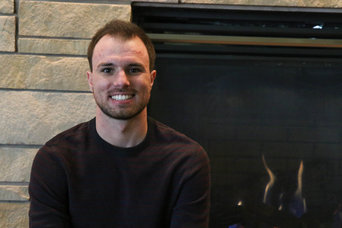Examining Empathy
Students to Take Neuroscience Research to National Level
Who feels more empathy: a health-care professional or a pre-health student? Of the two, who shows more empathy?

A group of Weber State University undergraduates set out to find the answers to those questions last year because, according to WSU psychology student Chase Brower, “It’s important to gain an appreciation of how much empathy affects patients. You can have a great physician who knows what they’re doing, but if they’re not making the patient feel comfortable, the patient won’t feel like they’re receiving very good care. That’s a huge part of a person’s treatment.”
The student researchers gathered data from 29 participants: 13 health-care professionals and 16 undergraduate pre-health students. Each participant filled out a self-evaluation questionnaire to measure perceived empathy. Next, participants watched the movie “Wit,” which demonstrates the complex interactions among physicians, nurses and patients.
Whenever participants felt they were having an emotional response to the film, they pressed a button. In addition, the study measured facial activity using electromyography, which records electrical activity produced by contracting muscles. Galvanic skin response machines measured physical responses such as skin temperature and heart rate throughout the movie.
During the study, physicians reported feeling empathy much more often than the students. However, the students physically displayed more empathy.
“The physicians generally had lower facial activity,” explained Brower, who is pursuing a bachelor’s degree in psychology with minors in neuroscience and chemistry. “They were displaying empathy less, but they had significantly higher self-reported measures because they were pushing the button much more often than the students.”
Previous research suggests that physicians become desensitized, which can begin as early as their third year in medical school.
“It poses another question,” Brower said. “Are physicians actually perceiving empathy less? Or are they just not displaying emotions the same as they used to? These are important questions, because if the patient doesn’t see empathy displayed, they won’t feel like the physician is empathetic at all.”
Brower is continuing the research this semester, looking at genetic components of empathy. He is studying certain genes that have been identified as putting someone at a predisposition to higher empathetic behavior. He will present his findings at the National Conference on Undergraduate Research, the WSU Undergraduate Research Symposium & Celebration and the Rocky Mountain Psychological Association.
WSU’s Neuroscience Niche
WSU’s neuroscience program gives students like Brower opportunities to participate in in-depth studies of the brain.
“Neuroscience is cool because it provides a deeper and biological explanation of why things happen in psychology,” he said. “It’s a really interesting field, and I think it’s one we’ll see advance very quickly in the coming years.”
The program also gives students the chance to reach out.
Last year, for example, Brower was head of the Brain Awareness Week committee, which is a program Weber State participates in that reaches out to low-income schools in surrounding communities. It offers an opportunity for college students to engage younger children in the study of science.
“I remember one day we were doing an after-school program, and I was blown away by how many of the kids were interested in neuroscience,” he said. “I was under the impression that they wouldn’t take it seriously, that none of them would think it was cool at all. And so many of those kids were fascinated by it and seemed so intelligent. A lot of those kids have potential and people just don’t see it.”
A Student’s Thanks
Brower’s professors have inspired him, as have the peers he has become involved with through research and clubs — he is the vice president of WSU’s chapter of the prestigious Nu Rho Psi neuroscience honor society.
“I really appreciate the education that I’ve gotten at Weber State,” said Brower. “There are a lot of people in this area who really can’t afford to go to college, so I appreciate that this school focuses on making education affordable and accessible. I’ve been really impressed with the quality of education here. I feel lucky to go to a school where I can spend time with my professors after class and talk to them. I’ve worked with (neuroscience professor) Dr. Lauren Fowler for a couple of years now on research, and she’s great. I wouldn’t be where I’m at without Dr. Fowler.”